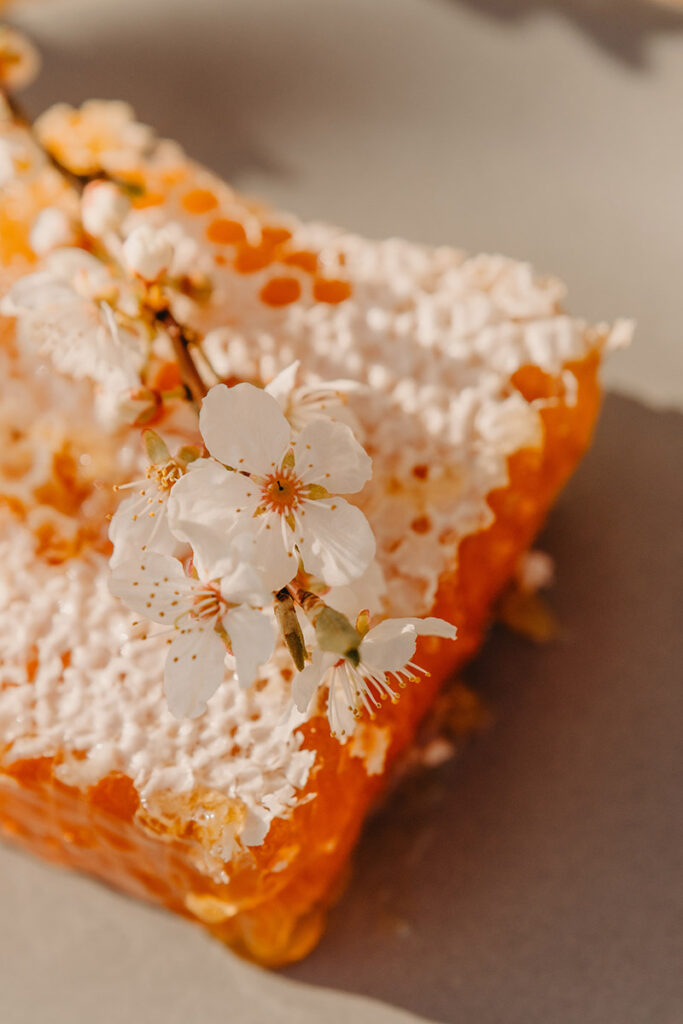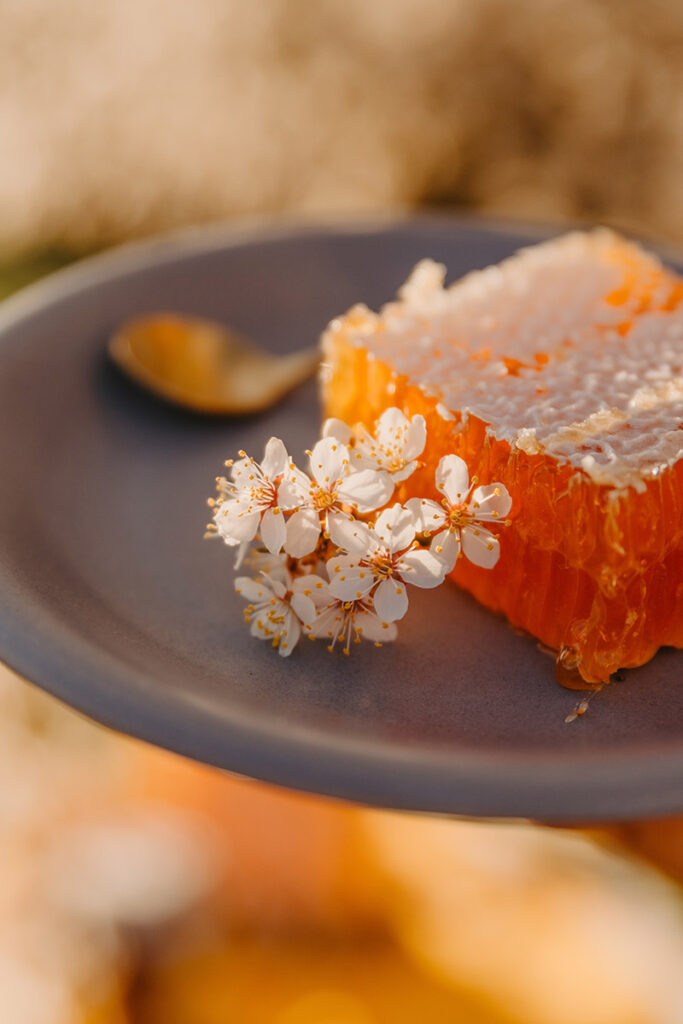The Surprising Benefits of Honey for Your Eyes
Is honey good for the eyes? As one of nature’s sweetest gifts, honey boasts numerous health benefits, but many of us underestimate its potential when it comes to improving our eye health.
In a world where we’re always seeking new information, our eyes have come under significant strain, making it more important than ever to nourish and protect them.
In this article, we will explore the remarkable benefits honey can bring to our eye health, uncovering the science behind its powerful properties and revealing how you can easily incorporate it into your daily routine.

Honey and Its Benefits
While honey is among the most popular natural sweeteners, its medical benefits are often overlooked. First and foremost, it’s well-known that honey can reduce inflammation thank to its antibacterial and anti-inflammatory properties.
However, it’s also a rich source of antioxidants, which can help protect our bodies from cell damage caused by free radicals.
But what does this have to do with our eyes? The answer is simple: as we age, our eyes are exposed to more oxidative stress due to factors such as UV radiation and pollution. This can lead to the development of eye diseases like cataracts and age-related macular degeneration.
Fortunately, honey’s high antioxidant content can help combat this oxidative stress and protect our eyes from these conditions.
A brief history of honey
Honey has been used for medicinal purposes since ancient times, dating back to at least 8000 years. The ancient Greeks believed that honey could extend life and considered it a gift from the gods.
Egyptians used honey in their recipes for embalming, and Ayurvedic medicine has long been using honey as a natural remedy for various ailments.
Today, science is catching up with these ancient beliefs and is discovering new ways in which honey can improve our health, particularly when it comes to our eyes.
Common health benefits
Firstly, honey contains an array of vitamins and minerals essential for our general health. It is rich in antioxidants, which protect the body’s cells from damage caused by free radicals and help prevent chronic diseases.
Moreover, honey has potent antiseptic properties, providing a natural barrier against bacteria and other harmful microorganisms.
Raw honey also has anti-inflammatory properties, making it an effective remedy for various conditions such as sore throats, coughs and other respiratory infections.
Implications for eye health
While honey benefits our overall health, its properties are particularly beneficial for our eyes. One of the most significant advantages is that honey can improve and protect our vision due to its antibacterial properties.
Our eyes are exposed to various bacteria daily, making them susceptible to infection and disease. Honey’s antimicrobial activity makes it a natural defense against these harmful microorganisms.
Moreover, honey can alleviate eye dryness, which has become a common problem in today’s society. The high sugar content of honey draws moisture to the surface of the eye, increasing lubrication and reducing irritation.

The Science Behind Honey’s Effects on Eye Health
The antibacterial and anti-inflammatory properties of honey are due to its chemical composition, which includes enzymes, amino acids, vitamins, minerals, and antioxidants.
Honey also contains hydrogen peroxide, a powerful antimicrobial agent that helps fight against bacteria and other microorganisms.
Natural ingredients found in honey
A tremendous diversity of honey enzymes creates a natural antibacterial environment. Glucose oxidase, an enzyme found in honey, breaks down into hydrogen peroxide and gluconic acid when exposed to water.
Furthermore, the presence of flavonoids and phenolic compounds in honey can enhance its antioxidant and anti-inflammatory effects.
And not just that, honey also contains essential minerals such as magnesium, potassium, and calcium, known to promote eye health and reduce the risk of age-related eye diseases like cataracts.
The role of antioxidants
Antioxidants protect cells from oxidative stress, which can damage the eye’s delicate structures. Honey contains several antioxidants, including pinocembrin and chrysin, which have been linked to improved eye health.
Moreover, honey also has anti-inflammatory properties that can help reduce chronic inflammation in the eyes that may lead to various eye conditions.
Another significant benefit of honey is its ability to enhance the immune system, which plays a crucial role in maintaining eye health. By boosting our body’s natural defenses, honey can help prevent infections and diseases that may affect the eyes.

Eye Issues That Can Benefit from Honey
Apart from general eye health, honey has been found to assist with several common eye problems. For instance, it can help with dry eyes, blepharitis (eyelid inflammation), and even cataracts.
Conjunctivitis (Pink Eye) Relief
Honey has been used as a natural remedy for conjunctivitis, or pink eye, for centuries. Studies have shown that diluted honey can effectively reduce the symptoms of pink eye, such as redness and discharge.
To use honey as a remedy, mix honey with distilled water and apply it to the affected eye using a clean cotton swab.
However, if you don’t feel comfortable using honey on your eyes, you can still benefit from its positive effects by consuming it regularly. Plus, always consult an eye doctor before trying any natural remedies for pink eye.
Cataract Prevention
Cataracts are a common age-related eye disease where the lens of the eye becomes cloudy, causing vision loss.
While surgery is the only treatment for cataracts, certain lifestyle changes and natural remedies may help prevent their formation. Studies have found that the antioxidants and anti-inflammatory properties of honey can help protect against cataracts by reducing oxidative stress in the eye.
Regularly consuming honey may also slow down the progression of existing cataracts, making it a simple yet effective way to promote eye health.
Dry Eye Relief
Dry eyes are a prevalent condition caused by a lack of moisture on the eye’s surface. Symptoms include discomfort, redness, irritation, and blurred vision.
The high sugar content in honey helps draw moisture to the eyes’ surface, providing temporary relief from dry eye symptoms. It can also help improve overall eye lubrication and reduce irritation in people with chronic dry eye syndrome.
Styes
Styes, or small lumps that form on the eyelid, can be painful and uncomfortable. Honey’s antibacterial properties make it a natural remedy for styes by reducing inflammation and preventing bacterial growth.
Applying a mixture of honey and warm water to the affected area can help soothe the symptoms and speed up healing. Or, you can also consume honey regularly to boost your immune system and prevent styes from forming.
Corneal abrasions
This term refers to a scratch on the surface of the eye, which can be extremely painful and may lead to further complications if not treated properly.
Honey’s antimicrobial properties make it an effective remedy for corneal abrasions as it helps prevent infections and promote healing.
However, always seek medical advice from an eye doctor if you have a corneal abrasion, as it may require further treatment.

How to Incorporate Honey Into Your Eye Care Routine
Now that we know about the numerous benefits honey has for our eyes, it’s essential to understand how to incorporate it into our daily routine effectively.
Topical application
One of the easiest ways to use honey for your eyes is by applying it topically. Dilute honey with distilled water and use a clean cotton swab to apply it gently to the affected area or as an eye wash.
However, this method is not suitable for everyone, as some people may be allergic to honey or experience discomfort when applied near the eyes. Always do a patch test before using honey on your eyes and stop if you experience any adverse reactions.
Consuming regularly
Including honey in your diet can also have significant benefits for your eye health. Add it to your breakfast smoothie or use it as a natural sweetener for your tea or coffee.
Just make sure to consume raw, unprocessed honey to get the most out of its nutrients and enzymes.
Complementary treatments
Honey can also be used as a complementary treatment alongside traditional medical care for certain eye ailments. Always consult your eye doctor before trying any alternative remedies and follow their advice for the best results.

Store Bought vs. Raw Honey
Of course, it’s essential to ensure the honey you use for your eyes is of high quality and safe for consumption.
Raw honey, also known as unpasteurized honey, is not processed or heated, preserving its natural enzymes and nutrients. This type of honey is considered the best for medicinal purposes and can be found at health food stores or local farmers’ markets.
However, if you’re planning to use raw honey for your eyes, make sure it is from a trusted source to avoid potential contamination or allergic reactions. If raw honey is not available, opt for store-bought honey that is 100% pure and free of any additives.
On the other hand, store bought honey may have gone through pasteurization, which involves heating the honey to kill any harmful bacteria. While this process may reduce some of its beneficial properties, it is still a healthier alternative to processed sugars and artificial sweeteners.
All in all, incorporating honey into your eye care routine can have numerous benefits for maintaining good eye health and preventing common eye problems.
Just remember to use it safely, consult with your doctor, and choose high-quality honey for the best results!
Manuka Honey and Its Benefits
Manuka honey is a type of raw honey specifically made from the nectar of the Manuka bush in New Zealand. It contains higher levels of enzymes and antioxidants compared to regular honey, making it even more beneficial for eye health.
Some studies have shown that manuka honey can effectively treat dry eyes, reduce inflammation, and promote wound healing due to its unique antibacterial properties.
However, because of its high potency, it’s essential to use manuka honey carefully and in consultation with a medical professional.
The best way to incorporate manuka honey into your eye care routine is by consuming it, either directly or by adding it to your food and drinks.
Just make sure to choose high-grade manuka honey with a UMF (unique Manuka Factor) rating of 10+ for maximum benefits.

Frequently Asked Questions
If you’re concern about using honey in general or honey in your eyes, here are some common questions answered to ease your worries. As usual, always keep in mind to consult with your doctor before trying any remedies.
Q: Can I use honey for eye infections?
A: Yes, the anti-inflammatory and antibacterial properties of honey make it an effective remedy for eye infections. However, always consult with your doctor first and discontinue use if you experience any adverse reactions.
Q: Can I use honey if I wear contact lenses?
A: It’s not recommended to use honey directly on your eyes if you wear contact lenses as it may cause discomfort and affect the contacts’ fit. However, consuming honey regularly can still have benefits for your overall eye health.
Q: How often should I use honey on my eyes?
A: This depends on the specific condition you are treating. For general maintenance and prevention, once or twice a week is sufficient. However, not all eye issues can be treated with honey, so it’s always best to consult with your doctor for proper guidance.
Q: Can I use honey as a substitute for eye drops?
A: No, honey should not be used as a substitute for prescribed medication or eye drops. It can only serve as a complementary treatment to help with certain symptoms and promote overall eye health. Always consult with your doctor for proper medical treatment.
Q: Can anyone use honey for their eye health?
A: While honey has numerous benefits for our eyes, it may not be suitable for everyone. People with allergies to all bee species and bee products should avoid using honey, and those with preexisting eye conditions or eye disorders should consult their doctor before trying any remedies.
It’s always better to be safe than sorry when it comes to our eyes! So, make sure to do your research, consult with a professional, and use caution when incorporating honey into your eye care routine.

To Sum It Up
Honey is not only a delicious natural sweetener but also a powerful remedy for maintaining good eye health.
Its antimicrobial, anti-inflammatory, and antioxidant properties make it an excellent choice for treating common eye problems and preventing more severe conditions.
If you would like to read more about foods and natural remedies to promote eye health, check out our other articles on the topic:





